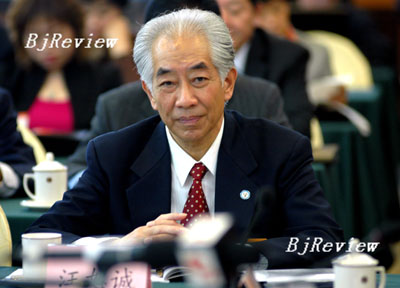
China's Minister of Water Resources, Wang Shucheng, is talking tough about the nation's most important river, calling for sustainable development and conservation of all life forms in the Yangtze River. Wang made the proposal at the Second Yangtze Forum on the protection and development of the river convened in Changsha, capital of central China's Hunan Province, on April 15.
An official report published earlier this year revealed that a large amount of waste continues to contaminate Yangtze water, with almost 30 percent of its major tributaries heavily polluted, causing aquatic extinction and higher risks of natural disasters.
Given the critical state of environmental affairs, the minister has pledged not to allow any further economic development at the expense of the environment. According to him, the Yangtze will be divided into several function sections in an attempt to develop a system for trading pollutant discharges along the lines of the Kyoto Protocol's carbon trading scheme. "The pilot program has already been put into effect in some provinces [along the river]," Wang revealed.
Wang also proposed that only 60 percent of the total capacity of the Yangtze be exploited. "The remaining 40 percent should be preserved to maintain the river's current ecosystem and biodiversity," he said.
However, a utilization ratio of 40 percent is considered the most appropriate worldwide to guarantee water quality, Wang warned.
The largest in China and the third longest in the world, the Yangtze flows 6,300 km, with a combined drainage area of over 1.8 million square km, accounting for 18.8 percent of China's total area. Its annual runoff stands at 951.3 billion cubic meters, accounting for 52 percent of the national total. The river is a major artery of inland water transportation in China.
The Yangtze Forum, held every two years, is a regular mechanism for brainstorming and sharing experience in pollution control, water resource conservation, as well as flood prevention and disaster relief.
"The former development program of the Yangtze, formulated in the 1950s, failed to take ecological and environmental factors into consideration. It's urgent for the government to redefine the development targets in line with conservation requirements and regulate the methods applied."
Weng Lida, Secretary General of the Yangtze Forum
"Flood control remains an arduous task along the Yangtze, given the rising temperature and frequent occurrences of extreme weather over the last 50 years."
Yang Guishan, researcher at the Nanjing Institute of Geography and Limnology
"The International Monetary Fund should respect its member countries' core interests and actual economic fundamentals. Biased advice would damage the fund's role in safeguarding global economic and financial stability."
Hu Xiaolian, Vice Governor of the People's Bank of China, rejecting calls for a quicker increase in yuan flexibility at a conference during the semi-annual meetings of the International Monetary Fund on April 14
"The Government has agreed upon the entire 'heavy assistance package' by the United Nations to the African force in Darfur."
Sudanese Foreign Minister Lam Akol, announcing on April 16 Khartoum's acceptation of the deployment of an additional 3,000 UN troops with attack helicopters to an under-manned African Union force in the country's war-torn western region
"If anything, we've made it
easier to access powerful weapons, it is long overdue for us to take some common-sense actions to prevent tragedies like this from continuing to occur."
Paul Helmke, President of the Brady Campaign to Prevent Gun Violence in the United States, speaking after the deadliest school shooting in the U.S. history left at least 33 dead and 15 wounded at Virginia Tech University on April 16
"The Middle East is on the verge of a new humanitarian crisis unless the European Union, the United States and other states take urgent and concrete measures."
Statement of Amnesty International, calling for urgent measures to assist 4 million Iraqis uprooted by conflict
"In the UK, we do not use the phrase 'war on terror' because we can't win by military means alone, and because this isn't us against one organized enemy with a clear identity and coherent set of objectives."
British International Development Secretary Hilary Benn, disputing the notion that military and economic force alone could solve world problems when addressing the Center for International Cooperation think tank in New York on April 16
| 